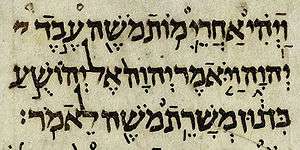Historical books
The historical books are a division of the Christian Bible, grouping 12 (or in some denominations more) books in the Old Testament.[1] In terms of the Tanakh, it includes the Former Prophets from the Nevi'im and two of the ungrouped books of Ketuvim, together with the Book of Ruth and the Book of Esther which in the Tanakh are both found in the Five Megillot. These 12 books make up the historical books in the Protestant Bible, but several other books not found in the Hebrew Bible are also included in Catholic and Orthodox Bibles (see the list below for details).
 | |||||||||||||||||||||||||||||||||||||||||
| Tanakh (Judaism) | |||||||||||||||||||||||||||||||||||||||||
|---|---|---|---|---|---|---|---|---|---|---|---|---|---|---|---|---|---|---|---|---|---|---|---|---|---|---|---|---|---|---|---|---|---|---|---|---|---|---|---|---|---|
|
|||||||||||||||||||||||||||||||||||||||||
| Old Testament (Christianity) | |||||||||||||||||||||||||||||||||||||||||
|
|||||||||||||||||||||||||||||||||||||||||
| Bible portal | |||||||||||||||||||||||||||||||||||||||||
The books tell the history of the Israelites spanning nearly a millennium, from their conquest of Canaan until the return to Zion in 539 BC. The historical books document the entry of the Israelites into the Promised Land after The Exodus, the leadership of the Biblical judges, the establishment of the United Monarchy and its subsequent division into the northern Kingdom of Israel and southern Kingdom of Judah, and the Babylonian captivity.[2][3]
List
The historical books of the main Christian canons are as follows:[4]
- Joshua
- Judges
- Ruth
- Samuel, split in two in Christian Bibles:
- I Samuel
- II Samuel
- Kings, split in two in Christian Bibles:
- I Kings
- II Kings
- Chronicles, split in two in Christian Bibles:
- I Chronicles
- II Chronicles
- Ezra (1 Esdras)
- Nehemiah (2 Esdras)
- Tobit (only included in the Catholic and Orthodox canons)
- Judith (only included in the Catholic and Orthodox canons)
- Esther
- Some of the Books of the Maccabees:
- 1 Maccabees (only included in the Catholic and Orthodox canons)
- 2 Maccabees (only included in the Catholic and Orthodox canons)
- 3 Maccabees (only included in the Orthodox canons)
- 4 Maccabees (only included in the Georgian canon)
- 3 Esdras (only included in the Russian and Georgian canons)
See also
- Biblical canon
- History of ancient Israel and Judah
- Other major divisions of the Old Testament:
References
- Vincent P. Branick (2011). Understanding the Historical Books of the Old Testament. Paulist Press. ISBN 978-0809147281.
- Bible.org - 4. The Historical Books
- Learn Religions - Historical Books
- Introduction to the Historical Books: Strategies for Reading - In Search of the Historical Books